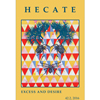AustLit
-
For forty-four years, Hecate has operated as a feminist investigation of the politics of affect that draws attention to the way certain gendered emotions are mobilised in public discourse (Luker 108). Today, UQ’s Fryer Library is home to the largest collection of Hecate archival material. Hecate is also published on-line, and is accessible through Informit, Ebsco and ProQuest. These archives continue to enable the exposure and accessibility of Australian female writing to an international audience.
The digitisation of feminist archives like Hecate enables feminist researchers to explore the identity and influence of past and present Australian women in literature and other faculties. Archives are a valuable asset to feminist (as well as socialist, anti-racist and anti-homophobic) writing and literature. The movement towards the digitisation of feminist works and their archival material has enabled greater accessibility and wider readership of female liberationist writing.
Australian Feminist Studies (Volume 32 2017) explored the historical and contextual complexity surrounding the term archive. Judith Allen argued that the plight of feminist literature archives was inhibited by Australian history. She writes: "the discipline of history could not serve the needs of feminism, and yet feminism needed history" (qtd. in Luker 202). The movement towards more viable feminist archival sources resulted from “the longevity of women’s oppression; …only history could explain the particular circumstances – times, places, contexts – in which women had resisted patriarchy” (qtd. in Luker 202). Moreover, drawing on feminist approaches to historiography, the attention to archival records has evoked effective responses that disclose the way archives have the ability to “motivate, inspire, anger and traumatise” (qtd. Luker 109).
The digitisation of feminist works, and their archival material is a greatly positive step for the foundation and integration of feminist literature in academic syllabus and research. However, Australian Feminist Studies points out that many practices of archiving are always within a context, and that feminist literature is susceptible to lacking a certain permanence. Much of feminist archival material, especially that concerned with postcolonial, peripheral and non-hegemonic contexts, is still reproached as having no serious academic worth or historical-significance. Archival material from writers like Ferrier is extremely important for supporting the growth and continuation of this imperative, yet complex literary field. With greater provision of feminist archival material, a history of women's voices can be better understood and identified as scholarly work.
Therefore, the digitisation of Hecate: An Interdisciplinary Journal and the Fryer Library's extensive collection of published and unpublished Hecate material continues to aid in female liberation for women all over the world.
You might be interested in...





